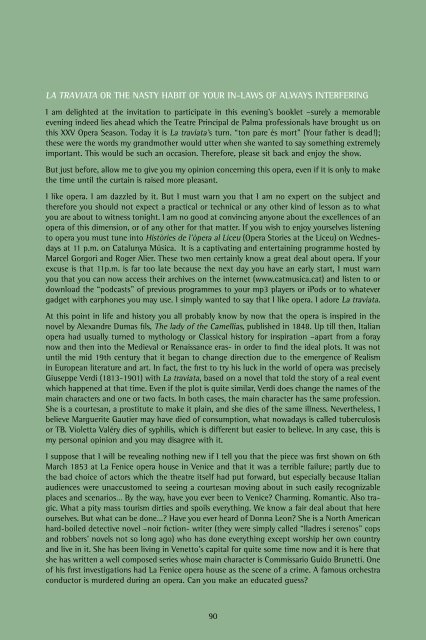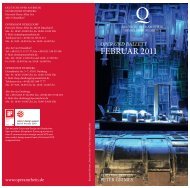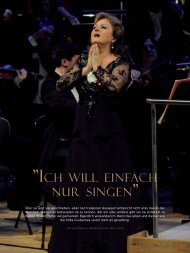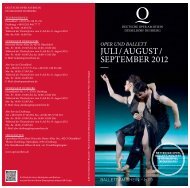temporada - IOCO
temporada - IOCO
temporada - IOCO
Create successful ePaper yourself
Turn your PDF publications into a flip-book with our unique Google optimized e-Paper software.
LA TRAVIATA OR THE NASTY HABIT OF YOUR IN-LAWS OF ALWAYS INTERFERING<br />
I am delighted at the invitation to participate in this evening’s booklet –surely a memorable<br />
evening indeed lies ahead which the Teatre Principal de Palma professionals have brought us on<br />
this XXV Opera Season. Today it is La traviata’s turn. “ton pare és mort” (Your father is dead!);<br />
these were the words my grandmother would utter when she wanted to say something extremely<br />
important. This would be such an occasion. Therefore, please sit back and enjoy the show.<br />
But just before, allow me to give you my opinion concerning this opera, even if it is only to make<br />
the time until the curtain is raised more pleasant.<br />
I like opera. I am dazzled by it. But I must warn you that I am no expert on the subject and<br />
therefore you should not expect a practical or technical or any other kind of lesson as to what<br />
you are about to witness tonight. I am no good at convincing anyone about the excellences of an<br />
opera of this dimension, or of any other for that matter. If you wish to enjoy yourselves listening<br />
to opera you must tune into Històries de l’òpera al Liceu (Opera Stories at the Liceu) on Wednesdays<br />
at 11 p.m. on Catalunya Música. It is a captivating and entertaining programme hosted by<br />
Marcel Gorgori and Roger Alier. These two men certainly know a great deal about opera. If your<br />
excuse is that 11p.m. is far too late because the next day you have an early start, I must warn<br />
you that you can now access their archives on the internet (www.catmusica.cat) and listen to or<br />
download the “podcasts” of previous programmes to your mp3 players or iPods or to whatever<br />
gadget with earphones you may use. I simply wanted to say that I like opera. I adore La traviata.<br />
At this point in life and history you all probably know by now that the opera is inspired in the<br />
novel by Alexandre Dumas fils, The lady of the Camellias, published in 1848. Up till then, Italian<br />
opera had usually turned to mythology or Classical history for inspiration –apart from a foray<br />
now and then into the Medieval or Renaissance eras- in order to find the ideal plots. It was not<br />
until the mid 19th century that it began to change direction due to the emergence of Realism<br />
in European literature and art. In fact, the first to try his luck in the world of opera was precisely<br />
Giuseppe Verdi (1813-1901) with La traviata, based on a novel that told the story of a real event<br />
which happened at that time. Even if the plot is quite similar, Verdi does change the names of the<br />
main characters and one or two facts. In both cases, the main character has the same profession.<br />
She is a courtesan, a prostitute to make it plain, and she dies of the same illness. Nevertheless, I<br />
believe Marguerite Gautier may have died of consumption, what nowadays is called tuberculosis<br />
or TB. Violetta Valéry dies of syphilis, which is different but easier to believe. In any case, this is<br />
my personal opinion and you may disagree with it.<br />
I suppose that I will be revealing nothing new if I tell you that the piece was first shown on 6th<br />
March 1853 at La Fenice opera house in Venice and that it was a terrible failure; partly due to<br />
the bad choice of actors which the theatre itself had put forward, but especially because Italian<br />
audiences were unaccustomed to seeing a courtesan moving about in such easily recognizable<br />
places and scenarios… By the way, have you ever been to Venice? Charming. Romantic. Also tragic.<br />
What a pity mass tourism dirties and spoils everything. We know a fair deal about that here<br />
ourselves. But what can be done…? Have you ever heard of Donna Leon? She is a North American<br />
hard-boiled detective novel –noir fiction- writer (they were simply called “lladres i serenos” cops<br />
and robbers’ novels not so long ago) who has done everything except worship her own country<br />
and live in it. She has been living in Venetto’s capital for quite some time now and it is here that<br />
she has written a well composed series whose main character is Commissario Guido Brunetti. One<br />
of his first investigations had La Fenice opera house as the scene of a crime. A famous orchestra<br />
conductor is murdered during an opera. Can you make an educated guess?<br />
La traviata. It is a delightful, romantic opera. A tragic one too. Just like Venice. But the plot<br />
takes place in Paris just prior to the establishment of the Second Republic. What a coincidence…<br />
Now comes the moment when I tell you that I owe my initiation into opera partly to the seduction<br />
and rejection caused by the cruel, vengeful and secretive world of the mafia –the Sicilian<br />
mafia if possible, although any of its variations will do. Whether we acknowledge it or not mafia<br />
and opera go together just like boxing and low punches, horse races and betting, tradition and<br />
solemnity, religion and sumptuousness, good and evil. Why don’t you watch again any of the<br />
three parts of The Godfather; all of its memorable moments are accompanied by a heartbreaking<br />
aria, bringing tears to the eyes of even the toughest. Personally, I would go for the end in the<br />
third part when the whole family is outside the theatre in Palermo where the eldest son has just<br />
debuted in an opera which is hardly ever put on stage and is called Cavalleria Rusticana by Pietro<br />
Mascagni. The assassin decides to act just as they are going down the façade’s staircase and<br />
shoots at Michael Corleone, but the bullet kills his daughter Mary instead. The father’s piercing<br />
scream at the sight of his dead daughter is one of those magnificent moments in the history of<br />
movies. The same happens to Al Capone in The Untouchables. He is deeply moved and weeps<br />
while listening to Ruggero Leoncavallo’s I pagliacci; in the meantime one of his men is reporting<br />
back that they have just murdered a cop. No wonder Al Pacino and Robert de Niro are the ones<br />
playing both these parts. “ton pare és mort” (Your father is dead).<br />
But we have not come here to see a film this evening. We have come to watch an opera. And one<br />
of the very best indeed. All I simply wanted to do was to explain how my insertion into the world<br />
of to opera had come about through hard-boiled crime fiction and film noir.<br />
By the way, have you noticed how many young people are in the theatre? There are quite a<br />
number and they are casually dressed. Opera is certainly not what it used to be. Maybe one of<br />
the great achievements of the Three Tenors has been to put opera in the streets of our towns –<br />
besides singing as very few singers in history could have done- . They have invited those who like<br />
myself knew very little about opera, to treasure and to love it… Anyway, the same faces as usual<br />
are here too; in their best outfits and fur coats and arriving late in the belief that the curtain<br />
won’t go up until they have sat down. Maybe they believe the Opera Season has been organized<br />
so that they can walk in late and be seen by everybody else.<br />
We mustn’t kid ourselves: they are part of the atrezzo or theatre props and accessories.<br />
Anyway, this happens to be a personal opinion and need not be shared by anybody else.<br />
Miquel Vicens Escandell, writer.<br />
90<br />
91






